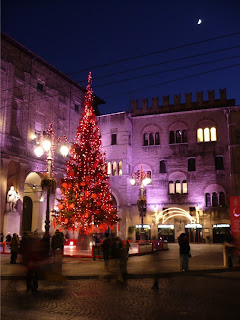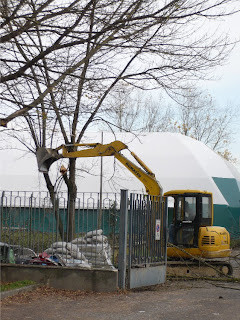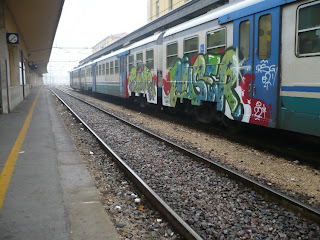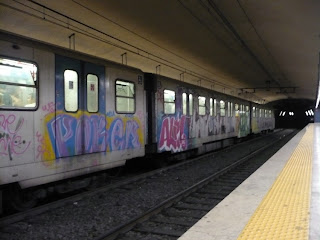 There has been a frost of early morning the last few days. Some of the cold lingered yesterday on north-facing roofs, in the shadows on the soccer pitch, along irrigation ditches out in the fields. The street cleaners whirring by sweep up the most recent brown leaves, remnants from an extended fall. Each week the signs of Christmas’s approach grow in number and illumination. As in the United States, whispers of Natale were heard in these parts as early as late October – in the supermarkets, I frequently saw panettone, the traditional Milanese sweetbread, alongside Halloween decorations.
There has been a frost of early morning the last few days. Some of the cold lingered yesterday on north-facing roofs, in the shadows on the soccer pitch, along irrigation ditches out in the fields. The street cleaners whirring by sweep up the most recent brown leaves, remnants from an extended fall. Each week the signs of Christmas’s approach grow in number and illumination. As in the United States, whispers of Natale were heard in these parts as early as late October – in the supermarkets, I frequently saw panettone, the traditional Milanese sweetbread, alongside Halloween decorations.

Now, every street has at least one house or apartment strung with lights (unfortunately I haven’t seen yet any of the palms trees so decorated). In the absence of yards, many hang the most popular decoration of the season from their windows or balconies: Babbo Natale climbing a rope ladder. Cute and everywhere. Though, with his feet dangling off the rungs, St. Nick looks less magical than out of shape, a kid struggling in gym class.

The towns and cities I have seen recently are tastefully, festively, even whimsically bedecked for Yule. In Milan, il Castello Sforzesco is draped with electric blue icicles. The comune of Parma have put up a large, well-appointed tree in Piazza Garibaldi; simple strands of white lights add elegance to a small side street.
Here in Codogno, as in many Italian communities, most of the streets in the center are spanned by a variety of bright stars and geometric constellations. One street even has wrapped presents sprouting from the walls above it.
I have seen no menorahs, dreidels, or potato latkes, much the pity. Hanukkah is not much celebrated in these parts.
We turn this week in our elliptical orbit - in the Northern Hemisphere a turn from darkness back towards light: the Winter Solstice. I hope that you and joy find each other, wherever you are and whomever you’re with. I hope that you can celebrate a festival of lights, with ample reasons for thanksgiving and continued hope for peace. And remember the words of Zuzu Bailey, “Every time a bell rings, an angel gets his wings.”
by Susan Cooper
And so the Shortest Day came and the year died
And everywhere down the centuries of the snow-white world
Came people singing, dancing,
To drive the dark away.
They lighted candles in the winter trees;
They hung their homes with evergreen;
They burned beseeching fires all night long
To keep the year alive.
And when the new year's sunshine blazed awake
They shouted, revelling.
Through all the frosty ages you can hear them
Echoing behind us - listen!
All the long echoes, sing the same delight,
This Shortest Day,
As promise wakens in the sleeping land:
They carol, feast, give thanks,
And dearly love their friends,
And hope for peace.
And now so do we, here, now,
This year and every year.






























